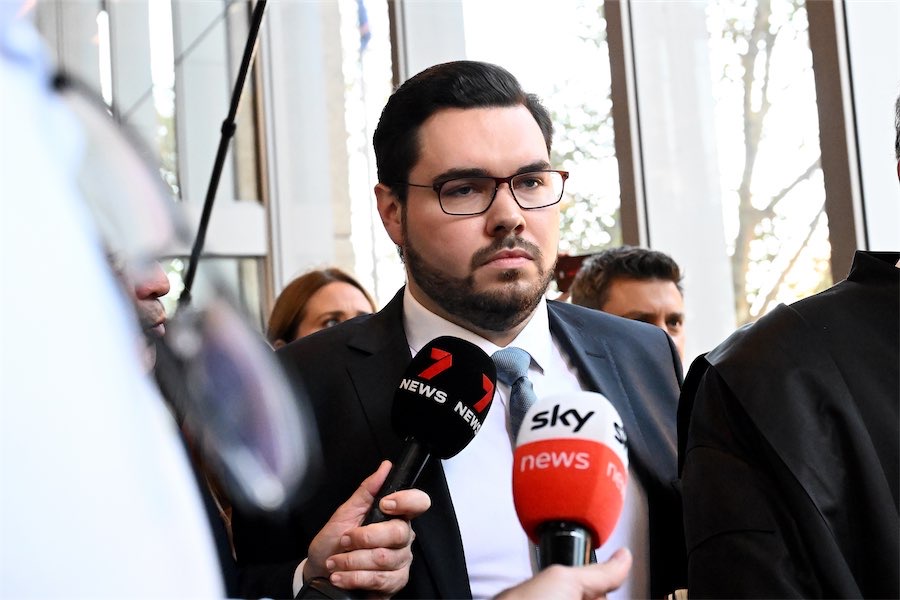Letter writer ROBIN UNDERWOOD says that with non-polluting e-buses running faster than the tram, the question would increasingly arise: “Why are we spending billions on the tram and suffer the roadworks for many years to come?
WITH the ACT planning a switch to all electric buses in 2040, we have 17 more years of pollution!

Have Canberrans elected an unprecedented number of Greens for that kind of policy?
Of course, with non-polluting e-buses running faster than the tram, the question would increasingly arise: “Why are we spending billions on the tram and suffer the roadworks for many years to come?”
Further, one can’t ignore the pollution caused not only in the production of concrete and steel for laying the tracks, but also for the stops where on the route to Woden, passengers have to be ferried into the middle of the road often by bridges and elevators. These produce additional greenhouse gases in their construction, operation and constant maintenance.
At other locations traffic lights will be used to get passengers to the stops, slowing down traffic, as on Northbourne Avenue.
Further, tram tracks in the middle of the road occupy space inaccessible for emergency vehicles when the calamities of climate change will visit us again and might well be responsible for the loss of life.
Last, not least, the question needs to be answered why we import totally assembled trams from Spain – the transport alone a further source of CO2 – when electric buses are produced in Australia, providing jobs and the possibility for export to Asia.
We have reached a point where heavy expenditure on advertising and public relations is failing to convince the public (except those living or planning to purchase next to a tram stop) of the rationale for extending the light rail to Woden.
Greens/Labor MLAs need to be increasingly prepared for awkward questions like: “What’s in it for you that, against all reason, you cling to that outdated policy of 2012?”
Robin Underwood, via citynews.com.au

Level base for rails will be costly
IN “Letters” (CN April 20), I discussed the engineering problems for light rail stage 2B (to Woden) in the Adelaide Avenue overpass at Hopetoun Circuit, one of the two most-used connections between the suburbs of Deakin and Yarralumla.
About a kilometre to the west is the Kent Street overpass, perhaps an even busier connection between the two suburbs.
The accompanying photograph shows a slope of about 12 degrees in the Adelaide Avenue median strip. Building light rail tracks would therefore necessitate a considerable amount of earth moving to provide a level base for the rails. It’s hard to imagine this process, and all the road traffic disruption it will cause.
It is also hard to see this work costing less than several hundred thousand dollars. Has the Barr government factored into their cost-benefit analysis (if there is one) such an expensive problem?
Dr Douglas Mackenzie, Deakin
When local doctors were ‘one of us’
THE medical centre I visited recently texted me to announce that gapless bulk billing will be ending for most of its patients and weekday appointments, and will be totally unavailable on weekends irrespective of personal circumstances.
Gap fees are no small matter for people in low-income employment in retail, hospitality, care occupations, transport/rideshare, cleaning and so forth. Gaps at a minimum are over $60 for the briefest consultation through the week, rising in stages to a whopping $150 out-of-pocket for a 20-minute appointment on the weekend.
And it doesn’t stop there: less common “prolonged appointments” of 40 minutes can run as high as a gap fee of $200!
I understand why doctors gravitate to these “clock on/clock off” jobs in “doctor nests” where reception, insurance and much else is all handled for them. But at what cost to the patient?
Group practices don’t simply share the overheads across the several doctors as a local “co-op” – there is, of course, a big business in running these things with a number of corporate players nationally acting as “middlemen” and shunting hundreds-of-millions of dollars annually to executives and shareholder profit.
So the convenience of the doctors comes at the cost of us paying twice: we are paying for (usually a very brief) conversation with a doctor, but we are also paying a commercial rate to a corporation that has inserted itself into grassroots medical care and is doing very nicely out of it, thank you very much.
Way back in my childhood in the ’60s it was a very different medical landscape. Family doctors organised themselves into independent practices deep in the suburbs. Indeed, you might have had a doctor’s practice as your neighbour, with part of a house converted as the medical surgery and waiting room.
My parents were battlers back then, and with a large family, yet I don’t recall that the doctor’s fee was a drama. Possibly this was because they were only being charged once, so to speak – by the doctor himself.
So I’m left wondering if part of the crisis in GP affordability is because the system has been colonised by rent-seeking corporates, and if the other part of the problem is that the once-humble family doctor is no longer “one of us” and has gradually become an executive with the corresponding executive salary?
Ross Kelly, Monash
Silence on planning is not golden
THE gate is wide open for the Liberals (“Libs need to pay more attention to planning”, citynews.com.au, April 15), given that the Labor/Greens ministers and MLAs seem to have gone to ground on all topical matters concerning planning reform.
Collective silence and very poor reaching out to constituents, for far too long, on the impacts and deficits of current planning practices, let alone what improved “outcomes” will be experienced very soon in electorates, and how this will happen, only reinforces the feeling that the “reform” bulldozer forges ahead and that it’s all about “our way or the highway”.
When emerging to campaign next year, many MLAs are likely to be tested about their engagement, or lack of it, on various planning matters. Residents will be able to sense any easy recourse to political party patter and to new superficial spin about the workings of the new “outcomes” system from Labor/Greens candidates.
In the meantime, how many MLAs have bothered to acquaint themselves directly with the hundreds of publicly accessible submissions made on the latest major planning reform documentation, as well as those submitted earlier about the draft planning bill?
And what on earth are they doing to consider and address the 49 recommendations made public on December 22 by the Assembly’s tripartite committee of inquiry into the draft planning bill?
Silence is not golden.
Sue Dyer, Downer
LETTERS / The Voice
Like Anzac Day, the Voice will strengthen, unite us
ANZAC Day should not be commemorated because it divides Australians on the basis of military service. Said no Australian. Ever.
Forty-nine per cent of Australians were born overseas or have one or both parents overseas born. They have little connection to “King and Country” that took Australia into a European war.
The disaster at Gallipoli had many causes, but one certainly was a misconception that Ottoman troops would never fight like an Englishman or their white descendants in the Australian and NZ colonies.
Almost all those from the world wars have passed. A smaller number who remain from wars fought alongside our American allies – and all these wars ended in Gallipoli-style disasters. Precious lives lost without victory.
Yet Anzac Day remains a very important part of our heritage, of what unites us all as Australians. We must keep this flame alive.
We also have a long cultural tradition dating back 60,000 years. The dreamtime, our ancient heart, the keepers of the flame in the words of our unofficial national anthem.
Recognising this heritage will, like Anzac Day, strengthen and unite us.
No evidence is ever produced that the Voice will divide us by race.
Just a minority belief that if repeated often enough it will be accepted by some voters as the truth.
Noel Baxendell, Holt
Hanson knows little about the constitution
GOOD on Jeremy Hanson for presenting a Voice opinion (CN April 20). However, it would have been preferable had he stuck to facts as I tried to do.
It’s a worry that a politician such as Mr Hanson seems to know little about the constitution, for instance, that it already enables laws affecting people of different races – Sec 51 (XXVI).
Furthermore, his “we’re working tirelessly to treat every individual equally”, is one of the great conservative myths. We have been discriminating against indigenous people since first contact and still are. The examples are voluminous, so there’s no need to repeat them here. The seemingly endless phrase, “closing the gap” should be sufficient.
It’s Mr Hanson who is being divisive by asserting the current indigenous MP’s work may be undermined by the Voice. With encouragement, they could be very helpful in making the Voice more effective (and, I expect, most will be keen to do so).
Next, there’s the claim that the Voice “risks an ongoing quagmire of High Court challenges”. So, Jeremy knows more than three former High Court judges (two of them chief justices) with more than 30 years’ collective court experience who say very clearly, any judiciable risk is highly unlikely.
Finally, Mr Hanson again raises the old ATSIC chestnut. Apparently, his “research” failed to uncover the obvious – that ATSIC was in no way comparable with the Voice. Is it not being able to see – or not wanting to?
Eric Hunter, Cook
It takes negotiation, compromise and honesty
JEREMY Hanson MLA appears to make considered arguments against the Voice to parliament that lay out why he will be voting no.
Firstly he doesn’t want to “entrench any racially based entity that treats one group of Australians differently to other Australians”. Sounds reasonable.
Unfortunately, educational results, incarceration rates, life expectancy all prove the fact that we have failed the first Australians.
Aborigines did not get the right to vote in Queensland until after 1967, as one example.
Mr Hanson states that he fears “institutionalising racial division in our founding document”. Our founding document was created after a referendum to all six states (there were no territories then) who were asked to amalgamate to form a nation.
Again sounds reasonable. So who could vote in this referendum? Well, certainly no woman voted, also if you were a male who did not own property. So bad luck poor working-class males, such as the Irish and English. If you were of any other ethnic group, such as the 40,000 Chinese, you could not vote and, of course, no Aboriginal or Torres Strait Islander was asked their opinion.
The case he presents denies the true reality. The fact is our founding document is as flawed as any document that advantages privileged white, wealthy males above all others.
It is time to acknowledge the truth and the failures of the past and not make statements that present a distorted view of that past.
This is a moment for the future. If we get it right we build a bridge to the oldest culture on the planet. When we cross that bridge we can make amendments to any policy, law or regulation we create.
Like a good marriage it will take negotiation and compromise and most of all honesty. Something sorely lacking in Mr Hanson’s article.
Colin Lucre, via email
More details about the alternative Voice, please
IN his article “Why I’m voting No” (CN April 20) MLA Jeremy Hanson, in supporting the push by Peter Dutton and Jacinta Price for local and regional Voices (but not a national one), does not mention two related issues.
Firstly, how would local and regional Voices from six states and two territories make their views on national policy issues known to the federal executive and the parliament?
Is the Coalition advocating the parliament and executive should receive representations from at least eight different Voices when framing policy rather than one? Or are they expecting local and regional Voices to submit their views through their federal members of parliament, who may hold different views, or be members of the political party in power making objectionable policy?
Secondly, there are already Aboriginal and Torres Strait Islander groups dealing with state and local issues. For example, in the ACT there’s the Aboriginal and Torres Strait Islander Elected Body, and in Victoria the First Peoples’ Assembly.
Is the Coalition advocating these groups be amalgamated with their proposed layer of local and regional Voices dealing with national issues? Or is the taxpayer to support a multitude of Voices?
Dutton has constantly insisted the Albanese government provide more details about the operation of the Voice. Will Jeremy provide details about their alternative approach?
Bill Bowron, via email
Australians won’t tolerate threats or deceit
ANY attempt by the government or media to force people to vote “yes” in the coming referendum by threatening them with the racist tag or some other disparaging term will most likely end in failure.
Moreover, if people suspect the government is attempting to deceive them by refusing to disclose the full meaning and scope of the Voice they will oppose it.
True, Australians are a fair-minded people and are prepared to listen to contending points of view, but they will never tolerate threats or deceit or be told how to think; nor will they allow themselves to be overwhelmed by cheap displays of emotion calculated to influence their vote.
Frank Reade, Macquarie
There is no need for the Voice
I WOULD like to let letter writer Eric Hunter (CN March 23) know that I fully support the constitution, and that is why I object to the Voice.
There is no need for the Voice. There are already 3000 Aboriginal Corporations, 30 Land Councils and 1300 people working for the NIAA – what more do they need?
There are a number of legal people and leading Aboriginals (including some that support the Voice and worked on the working group) that have stated on TV that what the prime minister is doing means it is racist or will cause racism, will split the nation and is doomed to failure.
The rest of the population do not have a Voice to parliament so why is it necessary?
Mr Hunter’s comment that Hugh Selby is a legal affairs commentator, was a gross misrepresentation of what Selby actually is. Selby is a barrister, practising in criminal law for both defence and prosecution, a teacher and author. Mr Selby did an excellent job explaining and referencing the report.
Vi Evans via email
An ‘arrogant’ waste of taxpayers’ money
ERIC Hunter (“Cut through the noise, Voice is a moral imperative” CN, March 30) asks the question: “Can the doubters guarantee that voting ‘no’ would result in significant betterment in the lives of indigenous Australians?”
One could equally ask: “Can the pro-Voice advocates guarantee that the Voice will?”
Additionally he asks: “What do the dissenters know that a very impressive list of supporters across the spectrum don’t?”
For Eric’s enlightenment, they know that an equally impressive list thinks otherwise and that both the legal fraternity and the indigenous community are hopelessly divided on the issue, which does not bode well.
Under the circumstances, to proceed with the referendum would be arrogant and a waste of an estimated $82 million of taxpayers’ money.
Mario Stivala, Belconnen
Who can be trusted?
In a world of spin and confusion, there’s never been a more important time to support independent journalism in Canberra.
If you trust our work online and want to enforce the power of independent voices, I invite you to make a small contribution.
Every dollar of support is invested back into our journalism to help keep citynews.com.au strong and free.
Thank you,
Ian Meikle, editor





Leave a Reply